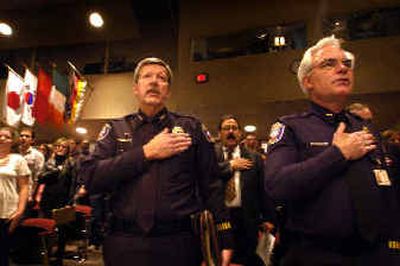City tax hike urged

The head of the Spokane city firefighters union called Monday for a utility-tax increase to prevent the loss of 75 city police officers and firefighters next year.
Lt. Greg Borg of Local 29 outlined a series of suggestions for saving money or raising revenue next year, but he said an increase in the tax on city utilities could be used as a “stopgap measure” until the city finds permanent sources of revenue to pay for public safety.
The proposal for a tax increase came midway through a sometimes emotional public hearing about the possibility of losing police officers, firefighters and city prosecutors.
“We implore you to maintain public safety levels,” said Rick Mendoza, chair of the Spokane Police Advisory Committee. “There is a war going on,” he said. “Today is not the day to cut police and fire.”
Those two departments take more than half the $118 million general tax fund, which is short some $18 million needed to continue the same level of services budgeted at the start of this year. Cuts began last September, and are being ordered across all nonutility services. Higher costs for wages and health benefits combined with sluggish tax revenue are the main causes.
Fire Chief Bobby Williams said his department is being cut $4.5 million for 2005 and will lose 58 firefighters and one civilian employee, including reductions made last September. That’s a 20 percent cut in staffing from the department’s $23.5 million general fund allocation. A separate emergency medical service fund and combined communications center fund bring the total department budget to $31.4 million.
Williams said the cuts would increase response times for some calls and leave areas of the city without nearby fire crews when engines are dispatched to fires and other big emergencies.
The Police Department is facing $7 million in cuts out of a budget of about $40 million. Police Chief Roger Bragdon said he is realigning his force to maintain as many patrol officers as possible.
He said the cuts will create higher risks for officers and increase the likelihood that citizens will become crime victims. Economic development efforts may suffer from weaker public safety, Bragdon said.
The packed hearing also drew everyday citizens.
Kimberly Moore sat through more than three hours of detailed budget discussions with a 5-month-old baby in her arms. When she got her chance to address the council, she said, “It’s me and it’s my baby … that need protection.”
She was accompanied by her mother-in-law, Twyla Miller, a South Side resident who said she has called police and firefighters three times in the past year – once for a burglary and twice for medical emergencies at her home.
Josh Adams, the president of the Lewis and Clark High School COPS substation, reminded the council that cuts in police and fire staffing will reduce career opportunities for young people like him.
V. Anne Smith, the president of the Spokane chapter of the NAACP, made a prediction. “There will be an increase in gangs if we cut our police department.”
In a short interview, Councilwoman Cherie Rodgers said she is willing to consider an increase in the city utility tax from 17 to 18 percent as well as a $1.5 million increase in the city’s cable television franchise fee, which is like a tax.
Rodgers’ plan also would delay Mayor Jim West’s proposal to create a City Hall division of economic development at an additional cost of $409,000 next year. She would also end city contributions to economic development organizations to save $175,000 and cut a $150,000 payment to the Downtown Spokane Partnership for security ambassadors and cleaning crews. Rodgers would also eliminate $150,000 in funding for Project Access, which helps low-income residents buy pharmaceuticals.
In all, her plan would make $3.4 million available for public safety and could be split between the police and fire departments, she said.
A 1 percent increase in the tax on city utilities would raise about $1 million.
Borg did not specify how much the tax should be increased, and except for Rodgers, council members didn’t comment on the idea. Borg said that firefighters also think the city should consider ballot measures to increase funding for public safety through property tax increases in 2006. He pledged fire union support for any such measures.
Borg also recommended diverting $1 million next year from city contributions to one of its firefighter pension plans. He said the plan currently has $15 million in assets, and receives about $4 million a year in city tax revenue. He said the money could be used without harming the fund’s ability to meet its obligations.
“Obviously, you are down here making hard decisions,” Borg said. “These are serious issues affecting our community. We are asking you to put money back in public safety.”
The council is expected to decide on the budget Dec. 13.